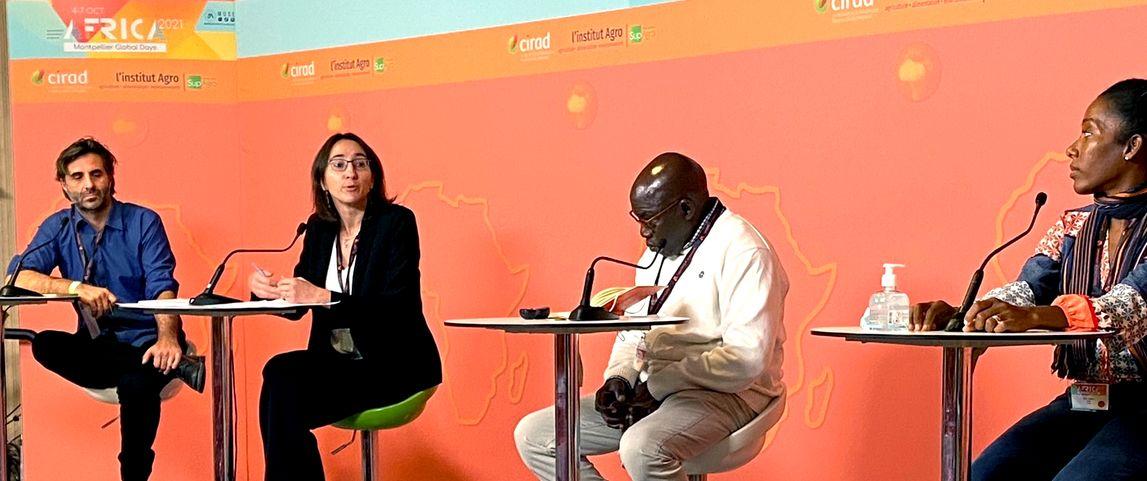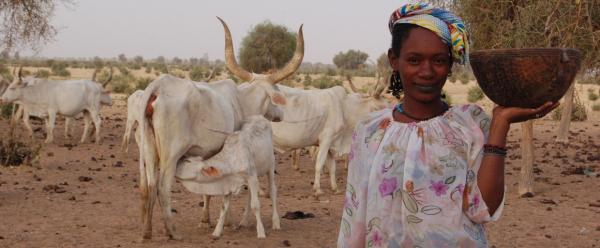Event 9 December 2025
- Home
- CIRAD news
- News
- Agroecological transitions - Montpellier Global Days
Montpellier Global Days: co-construction and training are a core part of agroecological transitions

Les Montpellier Global Days Africa 2021 ont donné lieu à deux jours d’échanges sur la transition agroécologique, pilotés par le Cirad, avec l’Institut agro © N. Kaden, Cirad
The Montpellier Global Days were held immediately prior to the New Africa-France Summit. Of the four days devoted to higher education, research and innovation, two focusing on agroecological transitions were led by CIRAD with Institut Agro, and associated CGIAR and AFD.
Agroecology is based on both principles of maintaining ecological processes and on socio-political principles. CIRAD and its African partners support agroecological transitions by generating knowledge that ranges from the field to the institutional mechanisms that facilitate upscaling, working with players on the ground to build and test solutions, and by providing training.
The agenda for the event included training and skill building, co-production of knowledge to facilitate action, organizational and market innovations to foster agroecological transitions, several testimonials from young professionals illustrating agroecological transitions in the world of business and in their careers, the example of the movement for an agroecological transition in Senegal (DyTAES), and a focus on sustainable cocoa, in partnership with Cémoi and Max Havelaar.
For CIRAD CEO Élisabeth Claverie de Saint-Martin: "the collaboration between Africa and Europe is mutually beneficial, particularly in the case of the agroecological transition, since Africa has a wealth of crop and livestock farming systems that are both more complex and less artificial than those in Europe. We have a lot to learn from Africa."
Partnerships and co-construction are central to action
"In Africa, the continent with which we work most, CIRAD is a core player in co-constructing knowledge", said Élisabeth Claverie de Saint-Martin as she introduced the event. Farmers are the leading players in the agroecological transition. We must involve them fully in research operations, particularly since they hold traditional know-how that supplements the knowledge produced by scientists. These principles also apply to collaborations between the different players in food systems: producers, consumers, processors, traders, etc.
Julie Matovu, organic practitioner from Uganda: "Participatory guarantee systems can help to scale up agroecology"
Agroecology, a solution to the challenges facing Africa and the planet as a whole
This is an increasingly universally held idea. Agroecology is a solution to the multiple challenges surrounding the climate, soil, water resource and biodiversity degradation, and growing demand for quality food. CIRAD and its African partners support agroecological transitions and their rollout, by producing knowledge, building and testing solutions, and providing training.
Sandra Rullière, Deputy Head, Agriculture, Rural Development and Biodiversity Division, AFD: "Agroecology is a solution"
Two necessities: training and agricultural advisory services
Training is a key issue for tackling the changes to come. This is particularly true given that in sub-Saharan Africa, agriculture and the agrifood sector are the main source of jobs, and half the population is under 30 years old. The number of students is set to double or treble by 2030. Training for young people and agricultural advisory services are therefore an urgent issue, with substantial potential for transformation. For CIRAD, it is vital to help young people in Africa to build sustainable, fair agricultural models.
Aimé-Felix Komlan Dzamah, agronomist, Sichem/AGRO-DR and Ecovie: "The main challenge in Africa is agroecological intensification"
Women are the leading players in agroecology in Africa
"In Africa, agroecological initiatives are often led by women", says Marie-Thérèse Daba Séné, a Senegalese sociologist specializing in agroecology. We must take greater account of the role of women, since they are a major lever for various actions in favour of the agroecological transition. This idea was borne out by a range of testimonials from young professionals.
Ndeye Khadiome Ndong, co-founder and manager, Dakane Agro-Cosmo: "An inclusive company for "Zero Waste" mango farming"
Diogou Dramé, founder and manager, La fabrique 621: "Juggling sustainability and profitability"
Watch the two days of exchanges



























